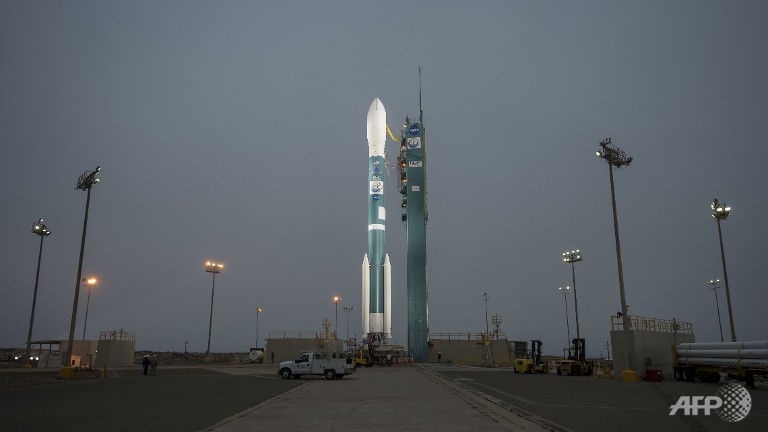NASA to try carbon satellite launch on Wednesday

The United Launch Alliance Delta II rocket with the Orbiting Carbon Observatory-2 (OCO-2) satellite onboard, is seen moments after the launch gantry was moved at the Space Launch Complex 2, on June 30, 2014, at the Vandenberg Air Force Base, California. (AFP/NASA/Bill Ingalls)
WASHINGTON: The US space agency will try again on Wednesday to launch a satellite designed to track carbon dioxide, a leading greenhouse gas that is responsible for global warming.
The first bid to send the Orbiting Carbon Observatory-2 to space was aborted at the last minute on Tuesday, after engineers discovered a problem with water flow to the launch pad.
The next attempt is now set for Wednesday at 2:56am Pacific time (0956 GMT) from Vandenberg Air Force Base in California.
NASA's two previous bids to send a carbon-tracking spacecraft into orbit failed due to rocket malfunctions in 2009 and 2011.
This time, NASA switched to a different type of rocket, the Delta 2, but an issue with the water suppression system to the launch pad caused engineers to halt the process at 46 seconds before liftoff early Tuesday.
"Pending the outcome of troubleshooting, the launch is rescheduled for Wednesday," NASA announced on its website.
The launch window is quite short, just 30 seconds.
The timing has to be precise so that the satellite could join the A-Train, a constellation of five other international Earth-observing satellites.
What the stars mean:
★ Poor ★ ★ Promising ★★★ Good ★★★★ Very good ★★★★★ Exceptional
Latest News
More News
- Russian President congratulates Vietnamese Party leader during phone talks (January 25, 2026 | 09:58)
- Worldwide congratulations underscore confidence in Vietnam’s 14th Party Congress (January 23, 2026 | 09:02)
- Political parties, organisations, int’l friends send congratulations to 14th National Party Congress (January 22, 2026 | 09:33)
- 14th National Party Congress: Japanese media highlight Vietnam’s growth targets (January 21, 2026 | 09:46)
- 14th National Party Congress: Driving force for Vietnam to continue renewal, innovation, breakthroughs (January 21, 2026 | 09:42)
- Vietnam remains spiritual support for progressive forces: Colombian party leader (January 21, 2026 | 08:00)
- Int'l media provides large coverage of 14th National Party Congress's first working day (January 20, 2026 | 09:09)
- Vietnamese firms win top honours at ASEAN Digital Awards (January 16, 2026 | 16:45)
- ASEAN Digital Ministers' Meeting opens in Hanoi (January 15, 2026 | 15:33)
- ASEAN economies move up the global chip value chain (December 09, 2025 | 13:32)
















 Mobile Version
Mobile Version